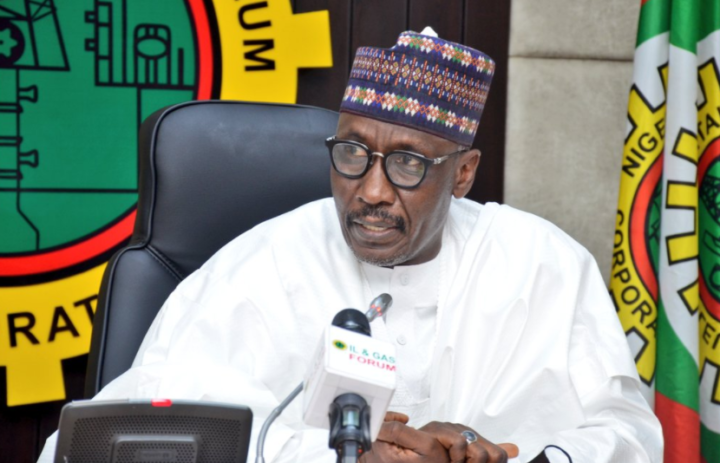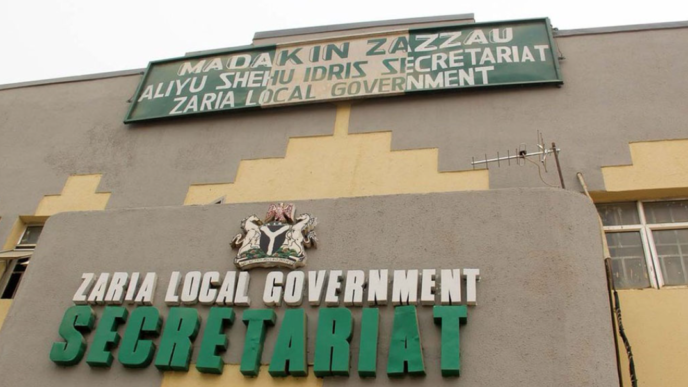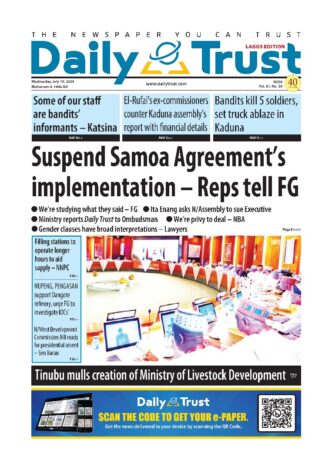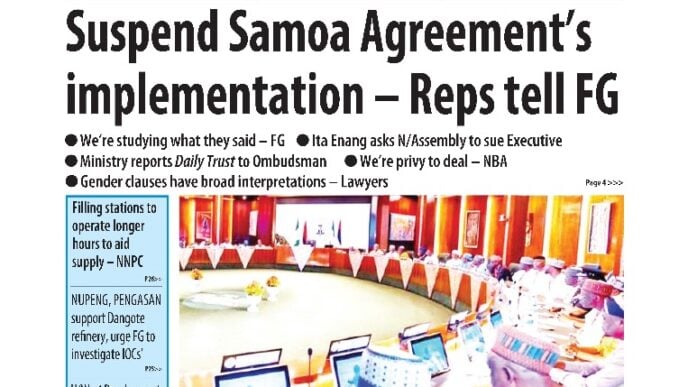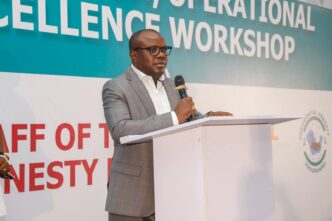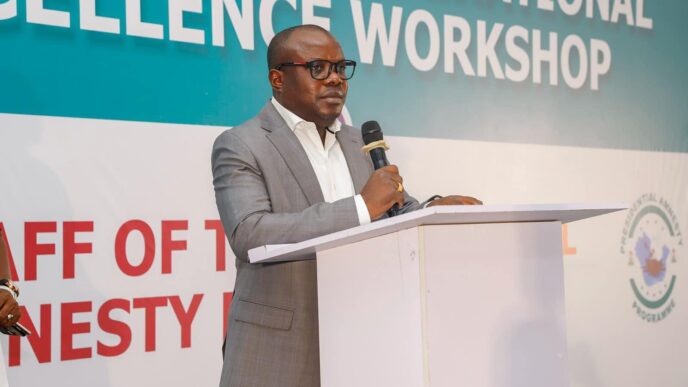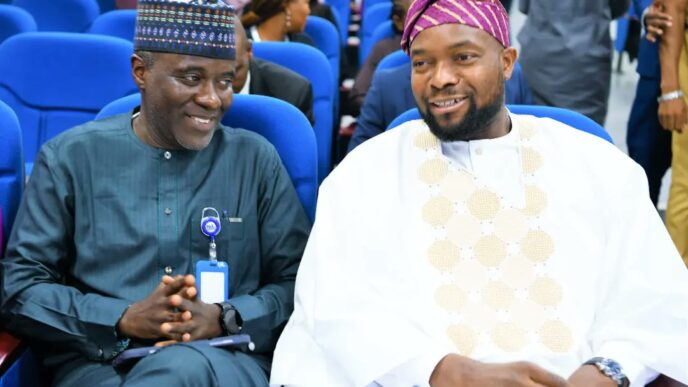Two recent events further underscore the centrality of Nigeria’s petroleum sector to the country’s economy, and the need for strategic approaches towards harnessing the sector for the country’s economic recovery. First was the July 2, 2024 declaration of a state of emergency on oil and gas production, to raise output to 2 million barrels per day (bpd) by Mele Kyari, the Group Chief Executive Officer of Nigerian National Petroleum Corporation Ltd (NNPCL).
The second was at the April 2024 Spring Meetings of the International Monetary Fund (IMF) and the World Bank (WB), where the core of Nigeria’s economic management team, consisting of Olawale Edun, Nigeria’s Finance Minister and Olayemi Cardoso, Governor of the Central Bank of Nigeria (CBN), jointly iterated their main strategy for economic recovery and revenue generation in the country- while tacitly celebrating an impending $2.25bn WB loan. The economic strategy consists of two things- expected increase in production of crude oil from 1.6 million bpd to 2 million bpd; and a Diaspora bond. In the words of Edun, ‘these measures are crucial for enhancing our fiscal resilience and ensuring long-term economic stability’. Given this centrality of the petroleum sector to the economic strategy of Africa’s most populous country, and the fact that it constitutes over 80 percent of foreign exchange earnings and non-debt government revenue, it therefore becomes imperative to panoramically review the condition of the sector, and perhaps suggest contributory policy approaches.
What then is the state of Nigeria’s petroleum sector, and what are the feasible options for short-medium term increase in crude oil production?
With an enormous oil and gas reserves of over 37 billion barrels of proven crude oil reserves, over 207 trillion cubic feet (tcf), and 600 tcf of proven and contingent gas reserves, Nigeria’s average oil production in the last 20 to 30 years had averaged 2.6million bpd, largely through joint ventures between the NNPCL and International Oil Companies (IOCs) as joint venture partners. However, the IOCs, which include Shell, ConocoPhillips, TotalEnergies, ExxonMobil, Chevron and Eni, decided in 2012 to reduce certain investments in Nigeria, with particular emphasis on divesting from onshore assets. As a result, capital spending in the country’s oil and gas industry significantly reduced by 70 percent year-on-year, from $20 billion to $6 billion per annum as at 2022, leading to a decline in oil production by 1million bpd in current times.
Advertisement
Following the enactment of the Nigerian Content Development Act in 2010, and the divestment of many onshore assets to domestic companies, it was expected that the domestic operators will be able to meet the production and investment volumes of the IOCs. With a decade of review in perspective, it becomes obvious that though the domestic operators are doing some appreciable work, they understandably require a bit more time to raise the human and financial capital that matches the production and investment levels of IOCs. Also, the recent complaints by the leadership of NNPCL about the difficulty they have faced in getting IOCs to invest and enhance production in recent times, leading to low output in the sector, strengthens the need for new policy approaches. It therefore becomes imperative to explore the means of attracting IOCs back to Nigerian onshore assets where most of the oil is produced, and make them discontinue any further divestments.
And what to do when structured IOCs have made what may seem like a firm decision on onshore divestments?
Make the IOCs an offer they will struggle to resist- but guided by geopolitical opportunities, national needs and strategy. The key offer can be 51percent ownership of NNPCL to IOCs via ‘Energy license’ offerings, with at least 10 percent provision for domestic energy firms such as SEPLAT Energy, First E&P, Waltersmith Petroman, and Renaissance Consortium, which in January 2024, won a $1.3 billion bid for 30 percent shares in Shell Petroleum Development Company (SPDC) JV as part of Shell’s strategy to divest from Nigeria onshore assets due to oil spills and theft. More on what the energy licenses will entail, later. But the license will come with terms and conditions for both onshore and offshore assets, that should lead to an increase in crude oil production to a minimum of 3 million bpd. This will enable Nigeria meet its revenue needs, as petroleum accounts for 80 percent of non-debt government revenue and foreign exchange earnings. That government recorded only 11.7 percent of projected revenue earnings or N318bn out of N2.7trillion of projected revenue earnings in Q1 2024, underscores the necessity of additional revenue. Debt servicing consumed 70 percent of foreign exchange within the same period, with inflation rising to decades high of 33.69 percent. Foreign direct investment has been on the decline, and the operating environment has made a number of multinational companies to cease operations in Nigeria, even as the naira lost over 300 percent of its value against US dollar since May 2023. This buttresses the urgent need for alternative revenue options for the year-old administration of President Tinubu, especially in the much feasible petroleum sector. The expected ramp up in production volumes should be quick, given the field experience of the IOCs in Nigeria’s onshore fields.
Advertisement
Despite Nigeria’s challenges, very few IOCs and their home countries can pass off the opportunity for major shareholding in the largest petroleum company in Africa, as well as the major firm in the largest economy and most populous country on the continent. The geopolitical changes within the continent and the purported reach-out to Nigeria by some Western countries for locating their military bases, still underscores the geopolitical opportunities inherent. This is not an argument for loss of national sovereignty, but a realist approach to addressing socioeconomic issues. For those who doubt if such firms can review their onshore decision, the attitude of their home governments in recommissioning coal fired plants and other non-renewable energy sources following energy restrictions from Russia since 2022, demonstrates how flexible otherwise firm decisions can be, if the terms and conditions are suitable.
Still on concerns about sovereignty, countries such as Qatar, Turkiye, Saudi Arabia, Bahrain, United Arab Emirates, Germany and Italy, which host foreign military bases, have continued to record impressive economic outcomes. During some of Nigeria’s most pressing periods, such as the civil war and onset of terrorism, it was Western countries such as the United Kingdom and United States that provided many of the most needed military equipment, training and support.
Strategic management is the key factor in managing such relationships. More specifically on sovereignty with NNPCL, Nigeria’s national oil company, the 51 percent of shareholding offered to IOCs, should be offered in a way that no single IOC will own more than 20 percent. That way, Nigerian government still remains single largest individual shareholder in NNPCL. Also, having some domestic operators as part of the consortium, ensures that there is provision for local content. The profitable Nigeria LNG ltd (NLNG) has similar ownership and management structure. In comparative terms, Petrobras, the Brazilian state-owned oil corporation with impressive commercial performance has just 28.67 percent Brazilian government ownership. Saudi Aramco, the Saudi state-owned oil corporation and second largest company in the world by revenue, has in 2019 and 2024, put up for public sale, a cumulative 2.14 percent of its shareholding, with about $41 billion raised in the process that has helped the Kingdom balance its budget deficits and fund large scale infrastructure projects.
On what the ‘energy license’ offering entails, it can include licenses for IOCs and their domestic partners to operate in Nigeria’s electricity sector. Some of these IOCs have evolved to include renewable energy as part of the portfolio, such as TotalEnergies and Shell. The licensing condition will encourage large-scale solar energy investments, such as the ‘Shams’, one of the world’s largest concentrated solar power plants built by TotalEnergies in the United Arab Emirates (UAE). As gas assets are a part of the 51 percent ownership, investments in gas will support the ‘Decade of Gas’ policy, while the resultant increase in gas infrastructure and production will support increased gas supply for energy purposes, the 4,128km Trans-Saharan Gas Pipeline project, and other similar projects that have been hindered by lack of investment. These energy investments will ensure that situations such as 767 manufacturing firms closing in Nigeria in 2023 due in large parts to huge off-grid energy costs, as well as the scarcity of crude oil being faced by Nigerian private refineries, are addressed. With these, government revenue and foreign exchange earnings will increase, while public debt, inflation and unemployment are reduced, thereby enhancing Nigeria’s economic stability and development. Furthermore, it provides an opportunity for what may probably be the final halo era of the sector, given the long-term implications of the commitments at 28th session of the Conference of the Parties (COP 28) to the UN Convention on Climate Change (UNFCCC) at Dubai in 2023, on fossil fuels.
Advertisement
But sustainably achieving these targets will require addressing some of the long-standing political factors partly responsible for agitations, insecurity and vandalism. That production surged to 2.2 million bpd without new drilling on April 17, 2020, during the COVID-19 lockdown as vandalism was halted at the period, demonstrates the cost of vandalism, while NNPCL has removed over 5,800 illegal connections from its pipelines and taken down over 600 illegal refineries in the past two years. Security approaches such as the ‘Crude Theft Monitoring Applications’ software application launched by NNPCL in August 2022, for oil-theft reporting and intelligence to be provided by people from oil-producing communities, have proved to be largely ineffective. While security contracts to private firms such as Tanita Security Services have recorded better outcomes, it still largely constitutes tokenism to locals of oil-bearing communities, and does not address some of the political concerns that enable vandalism.
From a cost-benefit perspective, it may therefore be more profitable for the current Nigerian constitutional review process to allow some level of sub-national government ownership of petroleum and mineral resources, or increased derivation, but with strict conditions on elimination of insecurity and vandalism, that should guarantee at least 3 million bpd production in 18 months. Sub-nationals such as Akwa Ibom state, have demonstrated excellent ability in managing high-skilled businesses, as exemplified by Ibom Air. Therefore, while IOCs are offered 51 percent, the oil-producing state governments should be offered 15 percent equity of NNPCL, which provides them the economic stake to ensure that agitations, insecurity and vandalism that discouraged investment from especially onshore assets, are finally addressed. These state governments already have oil producing agencies that ensure that relevant interventions are channeled to the communities. That crude oil, lithium, gold and other valuable minerals are now being mined and processed in larger quantities across other parts of the country, provide both the confidence and opportunity to address any concerns that come with such proposition for traditional oil producing states in the delta region.
These long-standing unresolved political issues may have partly influenced the submission of Patrick Pouyanne, the CEO of TotalEnergies at the Africa CEO Forum of May 16-17 2024, where he identified the long drawn nature of policy and political debates in Nigeria, which has made the company not to invest in any exploration in Nigeria for 12 years, but rather invest $6 billion in energy projects in Angola over Nigeria, despite Nigeria’s oil-bearing delta region being the most prolific part of West Africa.
And the financial statements of NNPCL, which not only show poor financial returns, but also underutilization of assets and resources, further justify the need for new management ideas and capital investment. Always better to own minority stake of a very profitable company that pays dividends, rather than owning 100 percent of an underutilized company.
Advertisement
For the company’s audited statement for the year ended December 2022, NNPCL has a total of N58.65 trillion in assets. Its liabilities however increased by 266.6 percent to rise to N49.35 trillion, from 2021. 2018 saw a loss of N803 billion, N1.7 billion in 2019, profit of N287 billion in 2020 and profit of N674.1 billion in 2021. Therefore, the company has only declared profit twice since its establishment in 1977, which further highlights the need for better management by IOCs. That the Nigerian government has barely suffered any losses, but profits from the NLNG where it owns minority 49 percent shares, is testament to the viability of this proposition. Also, that NNPCL has at least turned profitable on paper, is actually a good time to sell many shares, given that good value can be secured with a positive balance sheet, though the company’s relatively positive balance sheet does not tell the whole story, when assessed from more detailed and comparative perspectives.
With operating profit of N694.29 billion (or $1.61 billion), total revenue of N8.82 trillion (or $20.44 billion) and total assets of N58.65 trillion (or $136 billion), operating margin amounted to just 7.8 percent, and an asset turnover ratio of 14.7 percent. When compared to other national oil companies such as Petronas, Qatar Energy, Petrobras and Saudi Aramco, the below par performance of NNPCL becomes more contrasted.
Advertisement
For same period of 2022, Petronas had operating profit of $31 billion, revenue of $75 billion, and assets of $162 billion, leading to operating margin of 40.89 percent and asset turnover ratio of 46.29 percent. For Qatar Energy, operating profit was $26.7 billion, $53.8 billion in revenue and total assets of $162 billion, resulting to 49.63 percent operating margin and asset turnover ratio of 33.20 percent. In same vein, Petrobras had operating profit of $57 billion, revenue of $124 billion and assets of $187 billion, translating to 45.96 percent in operating margin and asset turnover ratio of 66.31 percent. Saudi Aramco had operating profit of $305.09 billion, revenue of $604.37 billion and assets of $664.78 billion, leading to 50.48 percent operating margin and asset turnover ratio of 90.91 percent.
Taken together, these four national companies recorded operating margins of between 40-54 percent, against 7.8 percent by NNPCL, and asset turnover ratio of 33-91 percent, against 14.7 percent by NNPCL. With recent reports about debts amounting to over $4 billion owed international suppliers and moves for additional loan of $2 billion from credit organisations, it further demonstrates the sub-optimal asset and general management of NNPCL, which justifies the need for management and ownership structure that gives better return on investment, for overall economic stability and development of Nigeria. This new management structure will also sustainably enhance the desired financial and economic reasons that necessitated the decision of government in February 2024 to move a substantial part of NNPCL accounts to the CBN.
Advertisement
Lastly for the economy. With Nigeria’s debt-to-GDP ratio rising to 52.9 percent, the first time it has crossed the 50 percent threshold, debt servicing consuming 65 percent of government revenue in 2023 and 70 percent of forex earnings spent on debt serving in Q1 2024, proceeds from a 51 percent sale of NNPCL shares to IOCs, can provide some buffer to negotiate for foreign debt relief.
With over a quarter of the current Tinubu administration spent, there is an increased need for more positive economic outcomes, especially after the shock therapy of petroleum subsidy removal and exchange rate unification have significantly reduced standards of living for many. The government can seize the contemporary geopolitical opportunity to offer IOCs and domestic companies a difficult-to-resist 51 percent stake in NNPCL, as part of energy licenses. This should lead to a boost in oil production from 1.6 million bpd to at least 3 million bpd, and provide government with foreign direct investment, increased revenue, reduce public debt and enhance macroeconomic stability. The electricity part of the energy licenses helps the IOCs meet their sustainability targets, while also providing Nigeria increased electricity and energy infrastructure for enhanced economic complexity and non-oil sector development. And political courage should be deployed to sustainably address the political concerns within the Niger Delta that facilitate insecurity, vandalism and divestments by IOCs, as a means to renewing hope and economic prosperity in Nigeria.
Advertisement
Dr. Uwanaka writes from African University of Science and Technology, Abuja. [email protected].
Views expressed by contributors are strictly personal and not of TheCable.
Add a comment

